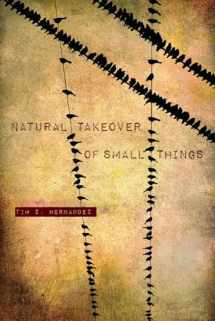
Natural Takeover of Small Things (Camino del Sol)
ISBN-13:
9780816530120
ISBN-10:
0816530122
Edition:
First Edition
Author:
Tim Z. Hernandez
Publication date:
2013
Publisher:
University of Arizona Press
Format:
Paperback
80 pages
FREE US shipping
Book details
ISBN-13:
9780816530120
ISBN-10:
0816530122
Edition:
First Edition
Author:
Tim Z. Hernandez
Publication date:
2013
Publisher:
University of Arizona Press
Format:
Paperback
80 pages
Summary
Natural Takeover of Small Things (Camino del Sol) (ISBN-13: 9780816530120 and ISBN-10: 0816530122), written by authors
Tim Z. Hernandez, was published by University of Arizona Press in 2013.
With an overall rating of 4.1 stars, it's a notable title among other
books. You can easily purchase or rent Natural Takeover of Small Things (Camino del Sol) (Paperback) from BooksRun,
along with many other new and used
books
and textbooks.
And, if you're looking to sell your copy, our current buyback offer is $0.39.
Description
Natural Takeover of Small Things is a collection of poetry that offers an unflinching view of “California’s Heartland,” the San Joaquin Valley. In his distinctive, lyrical, pull-no-punches style, Tim Z. Hernandez offers a glimpse of the people, the landscape, the rhythm, and the detritus of the rural West. As Hernandez peels back the façade of the place, he reveals that home is not always where the heart is.
The book opens with an image of Fresno as “the inexhaustible nerve/in the twitching leg of a dog/three hours after being smashed/beneath the retread wheel/of a tomato truck en route to/a packing house that was raided/by the feds just days before the harvest.” It ends with “Adios, Fresno,” an astringent farewell to the city: “You can keep your fields,/the sun will follow me./I won’t reconsider./I’ve overstayed my welcome/by three generations.” By then, we have toured the breadth of the San Joaquin Valley, have tasted Fuyu persimmons and lengua, have witnessed a home crumbling to foreclosure, and listened to the last words of a dying campesino. We’re made aware that this is an atmosphere scented by an entirely organic stew—a melding of culture, objects, and forms. This is a place where rubble mirrors the refuse of lives. But garbage is also compost. And if we squint, we can see through the wreckage a few small patches where love could be taking root and hope might actually be sprouting.
The book opens with an image of Fresno as “the inexhaustible nerve/in the twitching leg of a dog/three hours after being smashed/beneath the retread wheel/of a tomato truck en route to/a packing house that was raided/by the feds just days before the harvest.” It ends with “Adios, Fresno,” an astringent farewell to the city: “You can keep your fields,/the sun will follow me./I won’t reconsider./I’ve overstayed my welcome/by three generations.” By then, we have toured the breadth of the San Joaquin Valley, have tasted Fuyu persimmons and lengua, have witnessed a home crumbling to foreclosure, and listened to the last words of a dying campesino. We’re made aware that this is an atmosphere scented by an entirely organic stew—a melding of culture, objects, and forms. This is a place where rubble mirrors the refuse of lives. But garbage is also compost. And if we squint, we can see through the wreckage a few small patches where love could be taking root and hope might actually be sprouting.


We would LOVE it if you could help us and other readers by reviewing the book
Book review

Congratulations! We have received your book review.
{user}
{createdAt}
by {truncated_author}


